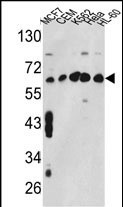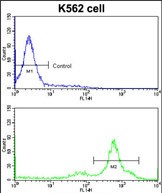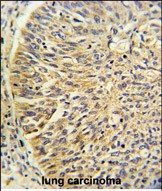



| WB | 1/1000 | Human,Mouse,Rat |
| IF | 咨询技术 | Human,Mouse,Rat |
| IHC | 1/100-1/500 | Human,Mouse,Rat |
| ICC | 技术咨询 | Human,Mouse,Rat |
| FCM | 1/10-1/50 | Human,Mouse,Rat |
| Elisa | 咨询技术 | Human,Mouse,Rat |
| Aliases | T-complex protein 1 subunit gamma, TCP-1-gamma, CCT-gamma, hTRiC5, CCT3, CCTG, TRIC5 |
| Entrez GeneID | 7203 |
| WB Predicted band size | 60.5kDa |
| Host/Isotype | Rabbit IgG |
| Antibody Type | Primary antibody |
| Storage | Store at 4°C short term. Aliquot and store at -20°C long term. Avoid freeze/thaw cycles. |
| Species Reactivity | Human |
| Immunogen | This CCT3 antibody is generated from rabbits immunized with a KLH conjugated synthetic peptide between 298-326 amino acids from the Central region of human CCT3. |
| Formulation | Purified antibody in PBS with 0.05% sodium azide,1%BSA and 50% glycerol.prepared by Saturated Ammonium Sulfate (SAS) . |
+ +
以下是3篇关于CCT3抗体的参考文献及其摘要概述:
1. **文献名称**: "CCT3 promotes tumor progression by regulating cell cycle and immune infiltration in pancreatic cancer"
**作者**: Liu Y, et al.
**摘要**: 研究利用CCT3抗体进行免疫组化分析,发现CCT3在胰腺癌中高表达,通过调控细胞周期相关蛋白(如Cyclin D1)促进肿瘤生长,并与CD8+ T细胞浸润减少相关,提示其作为治疗靶点的潜力。
2. **文献名称**: "The chaperonin CCT3 controls oncogenic gene expression and cellular proliferation in HER2-positive breast cancer"
**作者**: Sanchez CG, et al.
**摘要**: 通过CCT3抗体的Western blot和免疫荧光实验,发现CCT3在HER2阳性乳腺癌中与MYC蛋白稳定性相关,敲低CCT3可抑制肿瘤细胞增殖,表明其通过调控致癌基因表达影响癌症进展。
3. **文献名称**: "CCT3 suppression prompts apoptotic cell death via dysregulation of the HSP90-AKT axis in hepatocellular carcinoma"
**作者**: Wang H, et al.
**摘要**: 研究使用CCT3抗体进行组织芯片分析,发现CCT3在肝癌中高表达,并通过调节HSP90-AKT信号通路抑制细胞凋亡。抗体阻断实验显示靶向CCT3可增强化疗敏感性,提示其临床治疗价值。
这些文献均通过CCT3抗体验证了该蛋白在肿瘤中的功能机制及潜在应用。如需具体文献链接或补充信息,可进一步提供检索关键词。
The CCT3 antibody is a research tool targeting the Chaperonin Containing TCP1 Subunit 3 (CCT3), a critical component of the TRiC/CCT complex. This eukaryotic chaperonin, composed of eight distinct subunits (CCT1-8), facilitates ATP-dependent folding of nascent polypeptides, particularly cytoskeletal proteins like actin and tubulin. CCT3 (also called TCP1γ) plays a structural and functional role in the TRiC complex, aiding in proper protein conformation and preventing aggregation.
CCT3 antibodies are widely used to study TRiC’s involvement in cellular processes, including cell cycle regulation, stress response, and cancer biology. Elevated CCT3 expression has been linked to tumor progression, metastasis, and poor prognosis in cancers such as hepatocellular carcinoma and glioblastoma, making it a potential biomarker. These antibodies enable detection and quantification of CCT3 via techniques like Western blotting, immunofluorescence, and immunohistochemistry. They also assist in exploring CCT3’s interaction with oncogenic clients (e.g., cyclin E, von Hippel-Lindau protein) and its role in diseases like neurodegeneration, where misfolded proteins accumulate.
Developed in various host species (rabbit, mouse) with clonal specificity, CCT3 antibodies are essential for elucidating TRiC’s mechanistic contributions to proteostasis and pathology, offering insights for therapeutic targeting.
×